Business Law 1 Assignment: Consideration, Existing Duty Rule Analysis
VerifiedAdded on 2021/05/30
|6
|1484
|39
Homework Assignment
AI Summary
This business law assignment analyzes a scenario involving a contract dispute between Gareth and Visit Victoria (VV). The core issue revolves around the application of the existing duty rule of consideration. The assignment examines whether VV is obligated to pay Gareth an additional $50 per car, considering Gareth's initial contractual obligations and a subsequent agreement for extra payment. The analysis considers the impact of the existing duty rule, which typically prevents additional payments for fulfilling existing contractual duties, referencing the case of Stilk v Myrick. However, the assignment also explores exceptions to this rule, particularly the situation where a party has obligations towards a third party, referencing Pao On v Lau Yiu Long. The conclusion differentiates between scenarios: In the first, VV is contractually bound to third parties, making them liable to pay Gareth the additional amount. In the second scenario, if visitors do not visit due to an event, the existing duty rule applies, and VV is not bound to pay extra, as the promise is not considered new.

Business Law 1
Business Law
Business Law
Paraphrase This Document
Need a fresh take? Get an instant paraphrase of this document with our AI Paraphraser
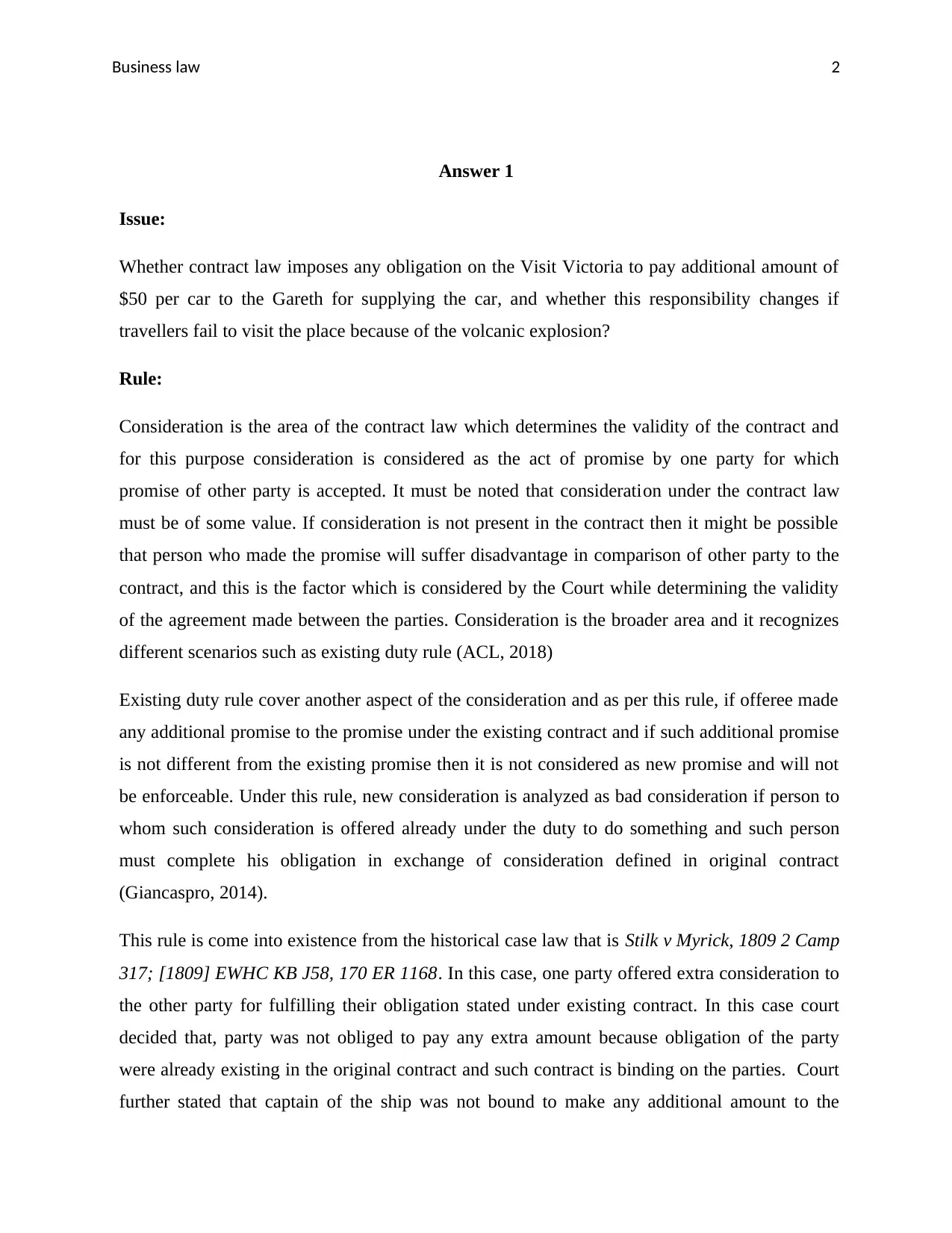
Business law 2
Answer 1
Issue:
Whether contract law imposes any obligation on the Visit Victoria to pay additional amount of
$50 per car to the Gareth for supplying the car, and whether this responsibility changes if
travellers fail to visit the place because of the volcanic explosion?
Rule:
Consideration is the area of the contract law which determines the validity of the contract and
for this purpose consideration is considered as the act of promise by one party for which
promise of other party is accepted. It must be noted that consideration under the contract law
must be of some value. If consideration is not present in the contract then it might be possible
that person who made the promise will suffer disadvantage in comparison of other party to the
contract, and this is the factor which is considered by the Court while determining the validity
of the agreement made between the parties. Consideration is the broader area and it recognizes
different scenarios such as existing duty rule (ACL, 2018)
Existing duty rule cover another aspect of the consideration and as per this rule, if offeree made
any additional promise to the promise under the existing contract and if such additional promise
is not different from the existing promise then it is not considered as new promise and will not
be enforceable. Under this rule, new consideration is analyzed as bad consideration if person to
whom such consideration is offered already under the duty to do something and such person
must complete his obligation in exchange of consideration defined in original contract
(Giancaspro, 2014).
This rule is come into existence from the historical case law that is Stilk v Myrick, 1809 2 Camp
317; [1809] EWHC KB J58, 170 ER 1168. In this case, one party offered extra consideration to
the other party for fulfilling their obligation stated under existing contract. In this case court
decided that, party was not obliged to pay any extra amount because obligation of the party
were already existing in the original contract and such contract is binding on the parties. Court
further stated that captain of the ship was not bound to make any additional amount to the
Answer 1
Issue:
Whether contract law imposes any obligation on the Visit Victoria to pay additional amount of
$50 per car to the Gareth for supplying the car, and whether this responsibility changes if
travellers fail to visit the place because of the volcanic explosion?
Rule:
Consideration is the area of the contract law which determines the validity of the contract and
for this purpose consideration is considered as the act of promise by one party for which
promise of other party is accepted. It must be noted that consideration under the contract law
must be of some value. If consideration is not present in the contract then it might be possible
that person who made the promise will suffer disadvantage in comparison of other party to the
contract, and this is the factor which is considered by the Court while determining the validity
of the agreement made between the parties. Consideration is the broader area and it recognizes
different scenarios such as existing duty rule (ACL, 2018)
Existing duty rule cover another aspect of the consideration and as per this rule, if offeree made
any additional promise to the promise under the existing contract and if such additional promise
is not different from the existing promise then it is not considered as new promise and will not
be enforceable. Under this rule, new consideration is analyzed as bad consideration if person to
whom such consideration is offered already under the duty to do something and such person
must complete his obligation in exchange of consideration defined in original contract
(Giancaspro, 2014).
This rule is come into existence from the historical case law that is Stilk v Myrick, 1809 2 Camp
317; [1809] EWHC KB J58, 170 ER 1168. In this case, one party offered extra consideration to
the other party for fulfilling their obligation stated under existing contract. In this case court
decided that, party was not obliged to pay any extra amount because obligation of the party
were already existing in the original contract and such contract is binding on the parties. Court
further stated that captain of the ship was not bound to make any additional amount to the
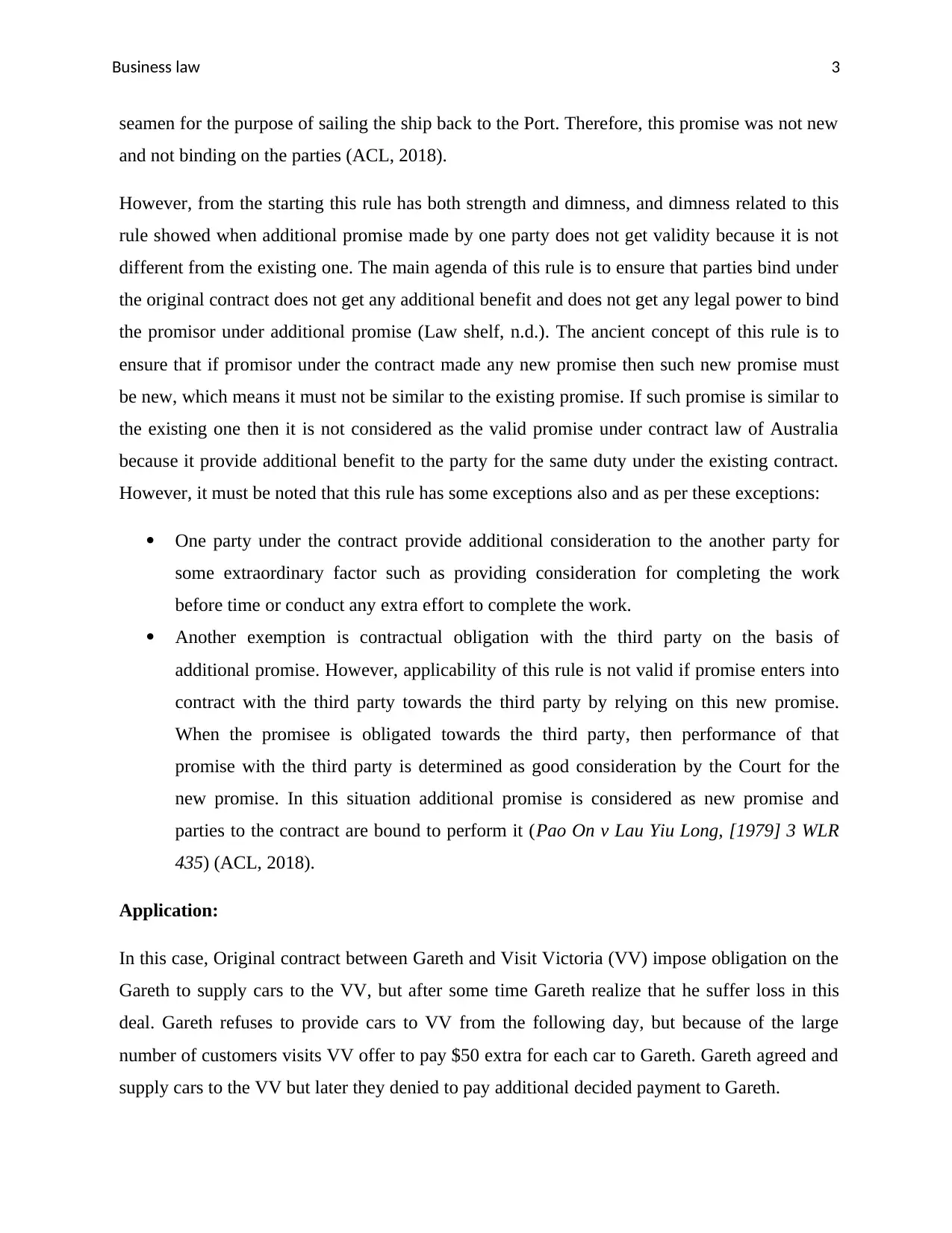
Business law 3
seamen for the purpose of sailing the ship back to the Port. Therefore, this promise was not new
and not binding on the parties (ACL, 2018).
However, from the starting this rule has both strength and dimness, and dimness related to this
rule showed when additional promise made by one party does not get validity because it is not
different from the existing one. The main agenda of this rule is to ensure that parties bind under
the original contract does not get any additional benefit and does not get any legal power to bind
the promisor under additional promise (Law shelf, n.d.). The ancient concept of this rule is to
ensure that if promisor under the contract made any new promise then such new promise must
be new, which means it must not be similar to the existing promise. If such promise is similar to
the existing one then it is not considered as the valid promise under contract law of Australia
because it provide additional benefit to the party for the same duty under the existing contract.
However, it must be noted that this rule has some exceptions also and as per these exceptions:
One party under the contract provide additional consideration to the another party for
some extraordinary factor such as providing consideration for completing the work
before time or conduct any extra effort to complete the work.
Another exemption is contractual obligation with the third party on the basis of
additional promise. However, applicability of this rule is not valid if promise enters into
contract with the third party towards the third party by relying on this new promise.
When the promisee is obligated towards the third party, then performance of that
promise with the third party is determined as good consideration by the Court for the
new promise. In this situation additional promise is considered as new promise and
parties to the contract are bound to perform it (Pao On v Lau Yiu Long, [1979] 3 WLR
435) (ACL, 2018).
Application:
In this case, Original contract between Gareth and Visit Victoria (VV) impose obligation on the
Gareth to supply cars to the VV, but after some time Gareth realize that he suffer loss in this
deal. Gareth refuses to provide cars to VV from the following day, but because of the large
number of customers visits VV offer to pay $50 extra for each car to Gareth. Gareth agreed and
supply cars to the VV but later they denied to pay additional decided payment to Gareth.
seamen for the purpose of sailing the ship back to the Port. Therefore, this promise was not new
and not binding on the parties (ACL, 2018).
However, from the starting this rule has both strength and dimness, and dimness related to this
rule showed when additional promise made by one party does not get validity because it is not
different from the existing one. The main agenda of this rule is to ensure that parties bind under
the original contract does not get any additional benefit and does not get any legal power to bind
the promisor under additional promise (Law shelf, n.d.). The ancient concept of this rule is to
ensure that if promisor under the contract made any new promise then such new promise must
be new, which means it must not be similar to the existing promise. If such promise is similar to
the existing one then it is not considered as the valid promise under contract law of Australia
because it provide additional benefit to the party for the same duty under the existing contract.
However, it must be noted that this rule has some exceptions also and as per these exceptions:
One party under the contract provide additional consideration to the another party for
some extraordinary factor such as providing consideration for completing the work
before time or conduct any extra effort to complete the work.
Another exemption is contractual obligation with the third party on the basis of
additional promise. However, applicability of this rule is not valid if promise enters into
contract with the third party towards the third party by relying on this new promise.
When the promisee is obligated towards the third party, then performance of that
promise with the third party is determined as good consideration by the Court for the
new promise. In this situation additional promise is considered as new promise and
parties to the contract are bound to perform it (Pao On v Lau Yiu Long, [1979] 3 WLR
435) (ACL, 2018).
Application:
In this case, Original contract between Gareth and Visit Victoria (VV) impose obligation on the
Gareth to supply cars to the VV, but after some time Gareth realize that he suffer loss in this
deal. Gareth refuses to provide cars to VV from the following day, but because of the large
number of customers visits VV offer to pay $50 extra for each car to Gareth. Gareth agreed and
supply cars to the VV but later they denied to pay additional decided payment to Gareth.
⊘ This is a preview!⊘
Do you want full access?
Subscribe today to unlock all pages.

Trusted by 1+ million students worldwide
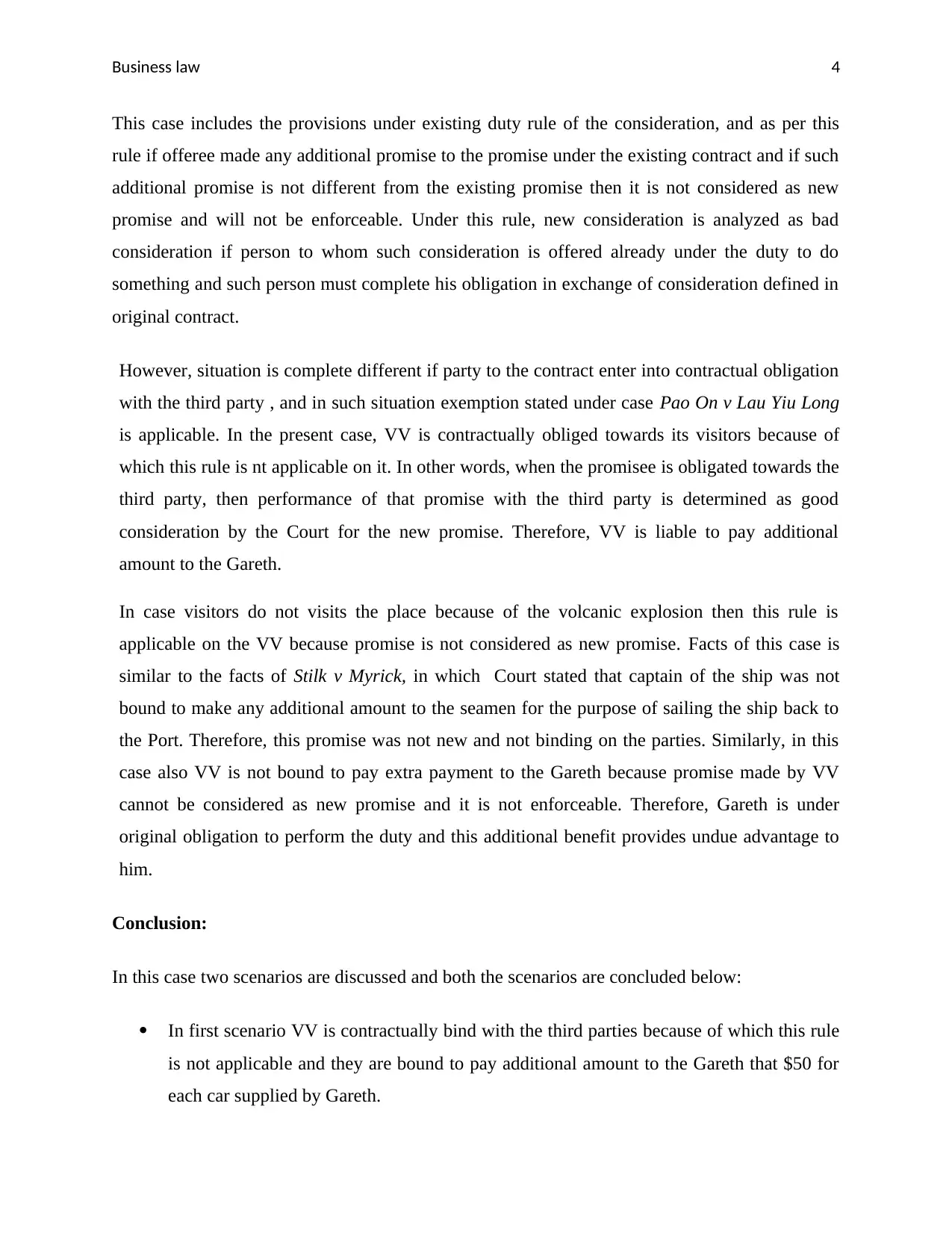
Business law 4
This case includes the provisions under existing duty rule of the consideration, and as per this
rule if offeree made any additional promise to the promise under the existing contract and if such
additional promise is not different from the existing promise then it is not considered as new
promise and will not be enforceable. Under this rule, new consideration is analyzed as bad
consideration if person to whom such consideration is offered already under the duty to do
something and such person must complete his obligation in exchange of consideration defined in
original contract.
However, situation is complete different if party to the contract enter into contractual obligation
with the third party , and in such situation exemption stated under case Pao On v Lau Yiu Long
is applicable. In the present case, VV is contractually obliged towards its visitors because of
which this rule is nt applicable on it. In other words, when the promisee is obligated towards the
third party, then performance of that promise with the third party is determined as good
consideration by the Court for the new promise. Therefore, VV is liable to pay additional
amount to the Gareth.
In case visitors do not visits the place because of the volcanic explosion then this rule is
applicable on the VV because promise is not considered as new promise. Facts of this case is
similar to the facts of Stilk v Myrick, in which Court stated that captain of the ship was not
bound to make any additional amount to the seamen for the purpose of sailing the ship back to
the Port. Therefore, this promise was not new and not binding on the parties. Similarly, in this
case also VV is not bound to pay extra payment to the Gareth because promise made by VV
cannot be considered as new promise and it is not enforceable. Therefore, Gareth is under
original obligation to perform the duty and this additional benefit provides undue advantage to
him.
Conclusion:
In this case two scenarios are discussed and both the scenarios are concluded below:
In first scenario VV is contractually bind with the third parties because of which this rule
is not applicable and they are bound to pay additional amount to the Gareth that $50 for
each car supplied by Gareth.
This case includes the provisions under existing duty rule of the consideration, and as per this
rule if offeree made any additional promise to the promise under the existing contract and if such
additional promise is not different from the existing promise then it is not considered as new
promise and will not be enforceable. Under this rule, new consideration is analyzed as bad
consideration if person to whom such consideration is offered already under the duty to do
something and such person must complete his obligation in exchange of consideration defined in
original contract.
However, situation is complete different if party to the contract enter into contractual obligation
with the third party , and in such situation exemption stated under case Pao On v Lau Yiu Long
is applicable. In the present case, VV is contractually obliged towards its visitors because of
which this rule is nt applicable on it. In other words, when the promisee is obligated towards the
third party, then performance of that promise with the third party is determined as good
consideration by the Court for the new promise. Therefore, VV is liable to pay additional
amount to the Gareth.
In case visitors do not visits the place because of the volcanic explosion then this rule is
applicable on the VV because promise is not considered as new promise. Facts of this case is
similar to the facts of Stilk v Myrick, in which Court stated that captain of the ship was not
bound to make any additional amount to the seamen for the purpose of sailing the ship back to
the Port. Therefore, this promise was not new and not binding on the parties. Similarly, in this
case also VV is not bound to pay extra payment to the Gareth because promise made by VV
cannot be considered as new promise and it is not enforceable. Therefore, Gareth is under
original obligation to perform the duty and this additional benefit provides undue advantage to
him.
Conclusion:
In this case two scenarios are discussed and both the scenarios are concluded below:
In first scenario VV is contractually bind with the third parties because of which this rule
is not applicable and they are bound to pay additional amount to the Gareth that $50 for
each car supplied by Gareth.
Paraphrase This Document
Need a fresh take? Get an instant paraphrase of this document with our AI Paraphraser
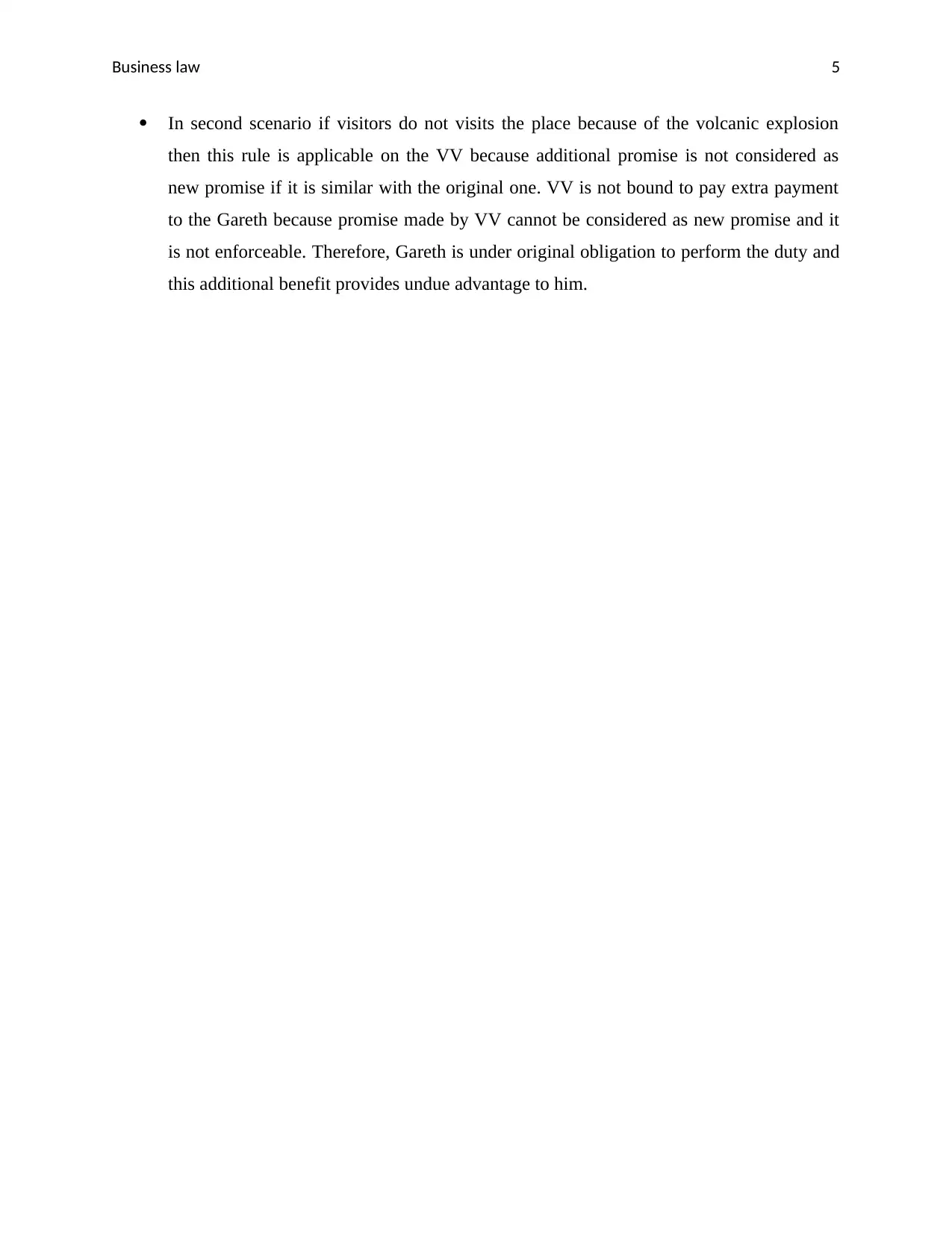
Business law 5
In second scenario if visitors do not visits the place because of the volcanic explosion
then this rule is applicable on the VV because additional promise is not considered as
new promise if it is similar with the original one. VV is not bound to pay extra payment
to the Gareth because promise made by VV cannot be considered as new promise and it
is not enforceable. Therefore, Gareth is under original obligation to perform the duty and
this additional benefit provides undue advantage to him.
In second scenario if visitors do not visits the place because of the volcanic explosion
then this rule is applicable on the VV because additional promise is not considered as
new promise if it is similar with the original one. VV is not bound to pay extra payment
to the Gareth because promise made by VV cannot be considered as new promise and it
is not enforceable. Therefore, Gareth is under original obligation to perform the duty and
this additional benefit provides undue advantage to him.
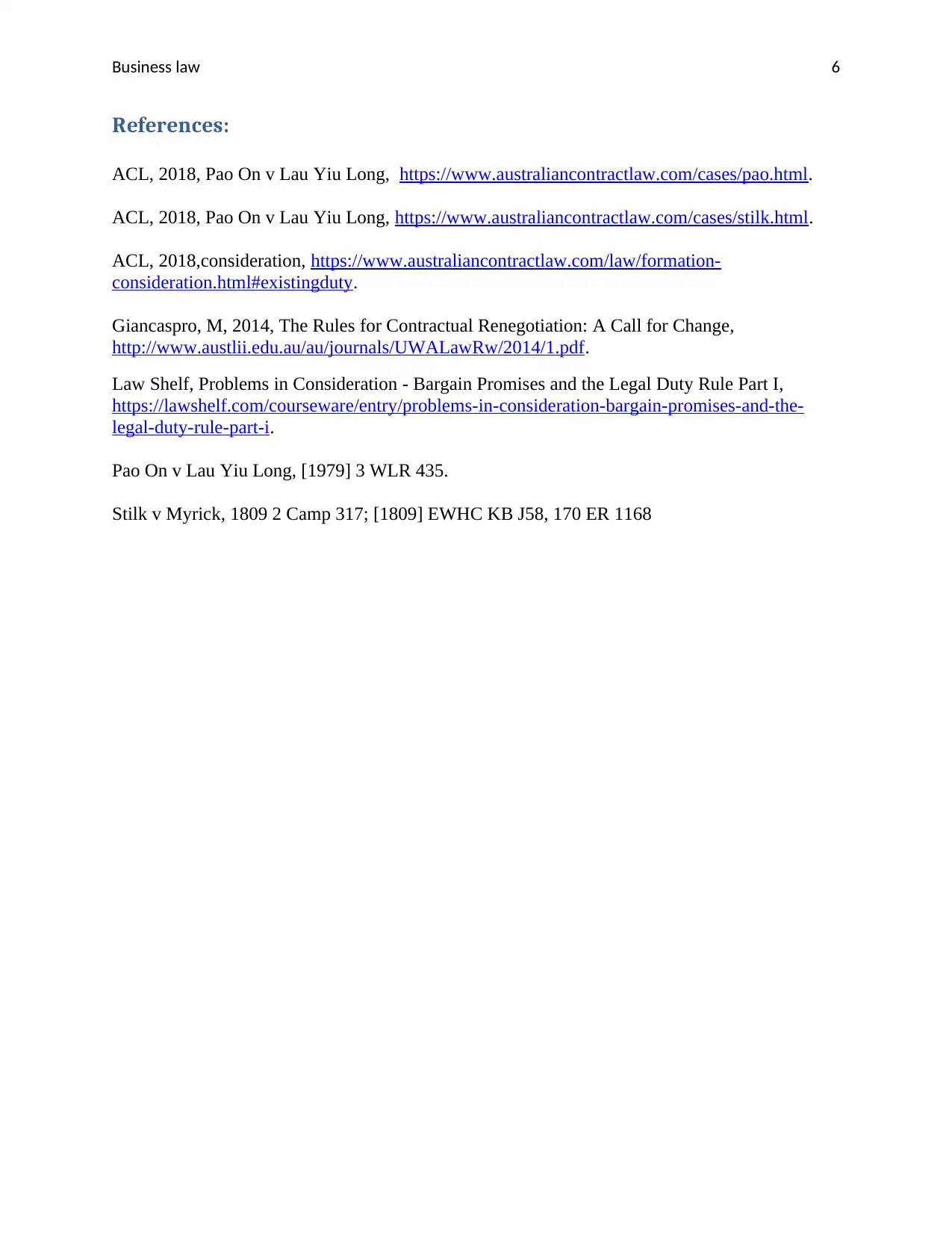
Business law 6
References:
ACL, 2018, Pao On v Lau Yiu Long, https://www.australiancontractlaw.com/cases/pao.html.
ACL, 2018, Pao On v Lau Yiu Long, https://www.australiancontractlaw.com/cases/stilk.html.
ACL, 2018,consideration, https://www.australiancontractlaw.com/law/formation-
consideration.html#existingduty.
Giancaspro, M, 2014, The Rules for Contractual Renegotiation: A Call for Change,
http://www.austlii.edu.au/au/journals/UWALawRw/2014/1.pdf.
Law Shelf, Problems in Consideration - Bargain Promises and the Legal Duty Rule Part I,
https://lawshelf.com/courseware/entry/problems-in-consideration-bargain-promises-and-the-
legal-duty-rule-part-i.
Pao On v Lau Yiu Long, [1979] 3 WLR 435.
Stilk v Myrick, 1809 2 Camp 317; [1809] EWHC KB J58, 170 ER 1168
References:
ACL, 2018, Pao On v Lau Yiu Long, https://www.australiancontractlaw.com/cases/pao.html.
ACL, 2018, Pao On v Lau Yiu Long, https://www.australiancontractlaw.com/cases/stilk.html.
ACL, 2018,consideration, https://www.australiancontractlaw.com/law/formation-
consideration.html#existingduty.
Giancaspro, M, 2014, The Rules for Contractual Renegotiation: A Call for Change,
http://www.austlii.edu.au/au/journals/UWALawRw/2014/1.pdf.
Law Shelf, Problems in Consideration - Bargain Promises and the Legal Duty Rule Part I,
https://lawshelf.com/courseware/entry/problems-in-consideration-bargain-promises-and-the-
legal-duty-rule-part-i.
Pao On v Lau Yiu Long, [1979] 3 WLR 435.
Stilk v Myrick, 1809 2 Camp 317; [1809] EWHC KB J58, 170 ER 1168
⊘ This is a preview!⊘
Do you want full access?
Subscribe today to unlock all pages.

Trusted by 1+ million students worldwide
1 out of 6
Related Documents
Your All-in-One AI-Powered Toolkit for Academic Success.
+13062052269
info@desklib.com
Available 24*7 on WhatsApp / Email
![[object Object]](/_next/static/media/star-bottom.7253800d.svg)
Unlock your academic potential
Copyright © 2020–2026 A2Z Services. All Rights Reserved. Developed and managed by ZUCOL.




